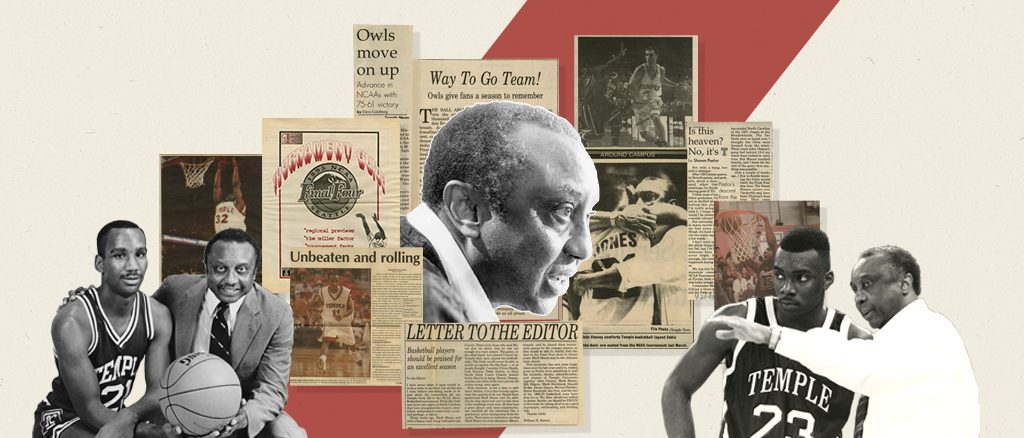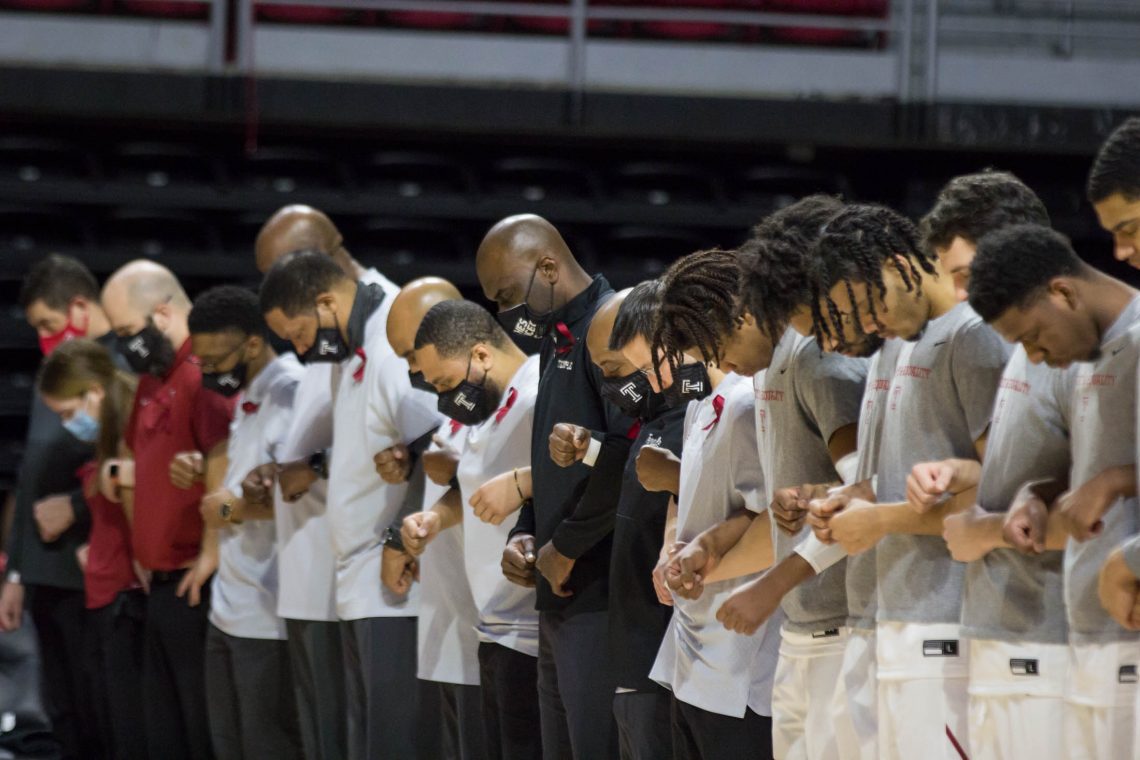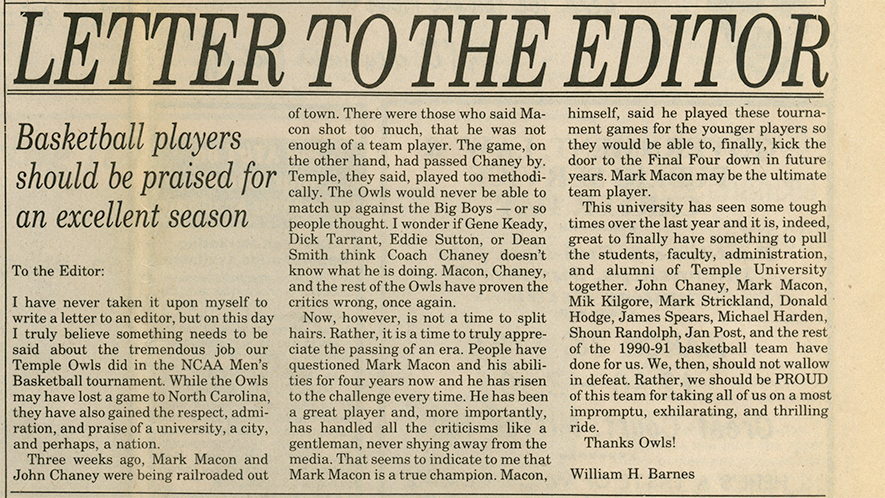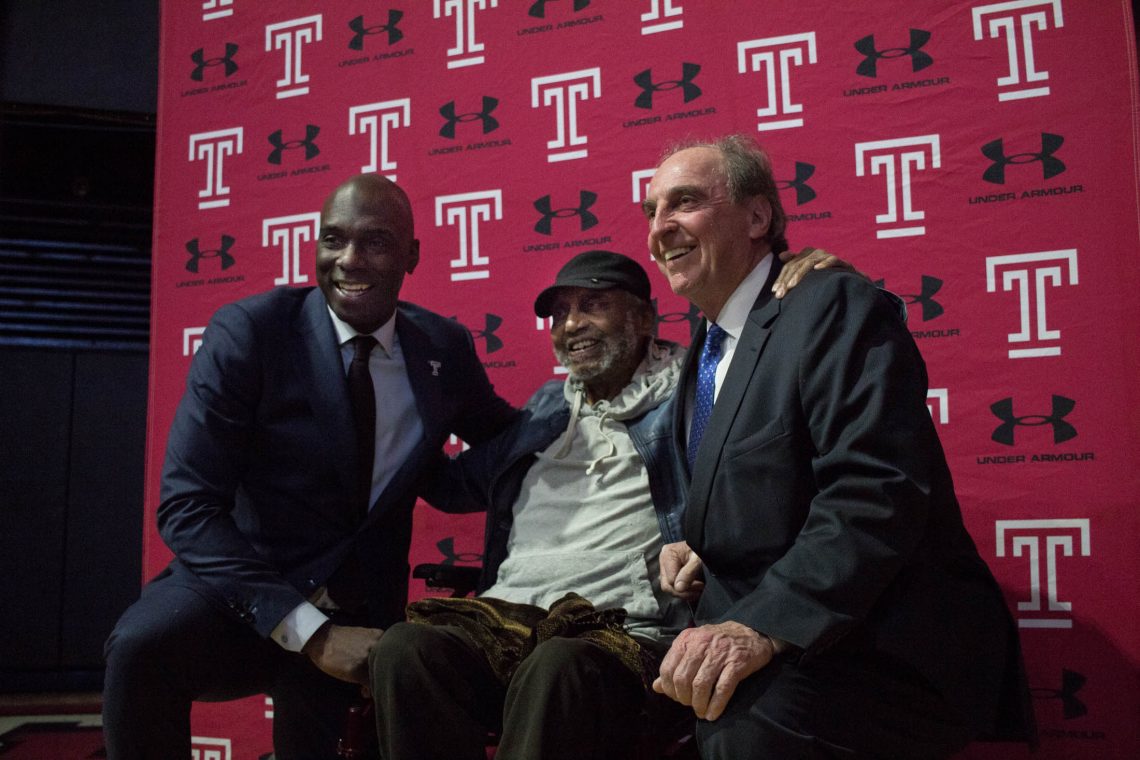
In a moment of silence to honor the passing of former coach John Chaney, Owls players and coaches stood side by side, linking each other’s arms on the court of the Liacouras Center surrounded by empty seats before taking on Tulane on Jan. 31.
Head coach Aaron McKie, who played under Chaney from 1991 to 1994, broke the line first after the moment of silence ended and led the team to the bench where they huddled together before taking to the court for tipoff.
Chaney, 89, who coached the Owls for 24 seasons from 1982 to 2006, died on Friday. Temple men’s basketball coaching staff wore red ribbons on their shirts during the game against the Green Wave in memory of him.
The winningest men’s basketball coach in university history, Chaney had a record of 516-253 and a winning percentage of .671 in his career with the Owls. After his hiring in 1982, he led the team to 17 NCAA Tournament appearances.
Chaney was inducted into the Naismith Memorial Basketball Hall of Fame in 2001, but to Fran Dunphy, Temple’s acting athletic director and Chaney’s successor as head coach, Chaney was a hall of famer in life too, Dunphy wrote in a release Friday.
“He touched countless lives, including my own,” Dunphy wrote in the release. “I will miss him dearly and my thoughts and prayers go out to his family during this difficult time.”

Throughout the years, Chaney was a worthy mentor of many young players who struggled in academics by advocating for them to focus on their studies as much as basketball. He had a significant impact on the program long beyond his tenure.
After his retirement, Chaney was always in contact with Dunphy after games, especially when the team committed a lot of turnovers, and he frequently talked with the players as well, Dunphy said.
“Coach Chaney was like a father to me,” McKie wrote in the Temple Athletics release. “He taught not just me but all of his players more than just how to succeed in basketball. He taught us life lessons to make us better individuals off the court. I owe so much to him. He made me the man I am today.”
Chaney served as a critical role model for McKie both as a player and as a coach, McKie said.
“I’m here now because of him,” McKie added. “He was one of few Black men I could look at in society and say I want to be just like them.”
McKie started his playing career under Chaney during the 1991-92 season and helped lead the Owls to the NCAA tournament while averaging 13.9 points per game. McKie was a local recruit from Simon Gratz High School in Huntington Park and grew up in Philadelphia. He ranks sixth all-time in points scored at Temple with 1,650 points.

McKie’s first memory of Chaney is from before high school when he went to watch Big-5 games at the Palestra on the University of Pennsylvania’s campus when Chaney was coaching Temple against the Quakers, he said.
“I had heard the name so many times, but I never saw him in person,” McKie added. “He has such a commanding presence and an aura about him. When I watched him coach and watched his antics and everything else, I would say, ‘That’s a tough guy right there.’ It was always something as a kid I wanted to be a part of.”
Before Temple, Chaney coached at Cheyney University for 10 seasons where he finished with a record of 225-59 and won an NCAA Division II championship.
“He forever placed Cheyney in the history books by accomplishing a major feat no other DII school in Pennsylvania has ever done,” wrote Cheyney President Aaron Walton in a press release following Chaney’s death. “He tremendously impacted the lives of his players, education, culture, the Philadelphia region and the entire country.”
Chaney took over Temple from former coach Don Casey, who coached the Owls for nine seasons but only led them to one NCAA tournament appearance. Former forward Granger Hall led the Owls with 14.9 points per game the year before Chaney was hired.
In his first season as a head coach in 1982, Chaney guided the Owls to a 14-15 record. It was the only time the Owls finished with a losing record during his tenure.
Chaney’s first win as the Owls’ head coach came on Nov. 30, 1982, when the team defeated George Washington University 68-67.
“Terry Stansberry connected the first of two free throws with four seconds left to give the Temple Owls a 68-67 victory over George Washington in the season opener for both teams,” was printed in The Temple News on Dec. 1, 1982, in an article by Mark Morgan, “Men barely win.” “It was the inaugural matchup for the new Atlantic 10 conference, and the first win for the Owls under new head coach John Chaney.”


Chaney came to Temple because former President Peter Liacouras told him the university would keep opportunities open for young people from the inner city, Chaney said during his hall of fame induction speech in 2001.
During his speech, Chaney was jovial but reflective of all those who helped him get to the hall of fame. He spent a large portion of the speech thanking his family, his assistant coaches and bosses at Temple.
“Temple would be a school that offers opportunity and access, even for its law school, its dental school, its hospital, all of the offerings in an inner city, and it would stay its course,” Chaney said in the speech. “Not leave the inner city, but stay there and serve the people who need it. That’s what convinced me to come to Temple, and I never thought about leaving Temple ever again.”
Chaney was well-known for demanding maximum effort from his players, and would routinely start practices around 6 a.m. Yet, this tough style of coaching is what led the Owls to five Elite Eight appearances in 1988, 1991, 1993, 1999 and 2001, with the first one coming after Temple defeated the University of Richmond 69-47 on March 24, 1988.
During the 1987-88 season, Temple finished with a 32-2 record and 18-0 record in Atlantic 10 play, and Chaney was named the Associated Press coach of the year.
The team was led by then-freshman guard Mark Macon, who Chaney recruited to Temple from Buena Vista High School in Saginaw, Michigan, in 1987.
Macon was a significant recruit for the team because of how well he played as a freshman, which led to Chaney giving him leeway to shoot whenever he wanted, Chaney said in an interview with the Orlando Sentinel in 1988.
“I wanted him here, with every fiber in my body,” Chaney said in that interview.

Macon led the team in scoring with 20.6 points per game in the 1987-88 season and was the Owls’ main catalyst for their Elite Eight appearance.
Macon served as an assistant coach under Chaney from 2003-06 before he left to coach at Georgia State University. He now serves as assistant to the head coach on McKie’s staff.
“Coach Chaney was [a father figure] to me,” Macon said in an interview with The Temple News on Sept. 23, 2020. “We always talked about what was happening in life and about being good citizens. We talked life.”
Chaney’s impact on basketball and Temple earned him a spot in the basketball hall of fame, but even when Chaney couldn’t make it past the Elite Eight, Temple fans defended him.
On March 27, 1991, in a letter to the editor in The Temple News, fan William Barnes wrote that Temple fans needed to appreciate Chaney more, even though the team lost in the Elite Eight to the University of North Carolina three days prior.
“Three weeks ago, Mark Macon and John Chaney were being railroaded out of town,” Barnes wrote. “There were those who said Macon shot too much, that he was not enough of a team player. Now, however, is not a time to split hairs. Rather, it is a time to truly appreciate the passing of an era.”


Temple’s roster would change significantly after this game as Macon entered the 1991 NBA draft and McKie joined the team as a freshman. It took the Owls just two years to return to the Elite Eight in 1993 when McKie and Chaney led the Owls to a 67-59 victory over Vanderbilt University on March 26, 1993.
On Feb. 13, 1994, when McKie was a senior, Chaney burst into a press conference and started yelling at John Calipari, the then-University of Massachusetts Amherst head men’s basketball coach and current University of Kentucky men’s basketball head coach.
The entire game was tightly contested as the Owls and Minutemen swapped leads multiple times. In the end, Temple lost by just a single point, 56-55. Chaney was upset at Calipari because he thought he manipulated the referees during the game. However, the two later reconciled their differences and became friends.
“I’m so saddened to hear that we have lost John Chaney, a coaching icon, a hall of famer, a molder of young men, the ultimate competitor and a dear friend,” wrote Calipari in a statement on Twitter after Chaney’s death. “Being able to compete against the best at a young age gave me a great opportunity to grow and learn.”
While Chaney’s conflict with Calipari played endlessly on television, it wasn’t the only time Chaney and his Owls were under scrutiny. Chaney never reached a Final Four and suffered some upset losses in the NCAA Tournament.
Temple came into the 2000 NCAA Tournament with high expectations after finishing the regular season with a 27-6 overall record and a 14-2 record in conference play. In the second round, on March 19, 2000, they came into a game against Seton Hall University and expected to win easily against the 10th seated Pirates, but instead suffered an 67-65 upset loss in overtime. The front-page headline of The Temple News four days later read “Owlch.”

Still, Chaney’s reputation wasn’t plagued by his outbursts and unsuccessful attempts to make it past the Elite Eight. He was known more for the strong relationships he developed with other coaches like Dunphy.
Dunphy and Chaney became friends while Dunphy was the head coach at the University of Pennsylvania. Dunphy’s mom always enjoyed having Chaney around, and Chaney enjoyed her cookies, Dunphy said.
“I had the honor of succeeding him here at Temple,” Dunphy added. “For that, I am very honored to have done that. I just think the man was a phenomenal human being who left a phenomenal legacy. I’m just grateful for my time with him.”
Chaney’s last Elite Eight appearance was in 2001 when the team lost 69-62 against Michigan State University, which was the last time Temple made it past the second weekend of the NCAA tournament.
During Chaney’s final season in 2005-06, the Owls finished 17-15 overall and 8-8 in the conference. Temple averaged 62.6 points per game and lost against St. Joseph University in the Atlantic 10 tournament 73-59 on March 10, 2006.
Chaney’s final win of his career was on March 9, 2006, against George Washington, who was ranked inside the top 14 in the country at the time. Temple finished with a winning record in the 2005-06 season and eventually earned a bid to the National Invitational Tournament.

Chaney announced his retirement on March 13, 2006, and did not coach in the Owls’ last game of the season when they lost to Akron in the NIT because his wife was undergoing a procedure for an undisclosed health problem, ESPN reported.
“It’s always a very traumatic time, but it is time,” Chaney said during his retirement speech. “Temple gave me a chance to make my own decision and that’s the great thing about it. Right now I’m faced with another problem with my wife, so it’s the right time to go.”
In his final season, Chaney would be remembered for emphasizing to his teams the importance of giving back and being a responsible member of their community, said Christopher Vito, a 2007 journalism alumnus who wrote for The Temple News covering men’s basketball during the 2005-06 season.
“He turned players, who would have otherwise been strangers to him, into sons, and for them, he was a father figure,” Vito said. “He would talk to the players off the court on life lessons and cornerstones because he got that basketball didn’t last forever and he would prepare these young men for life beyond the court.”
During that season, Vito and The Temple News’ editors had begun creating a catalog on John Chaney’s legacy during the early parts of the basketball season, even though Chaney hadn’t announced he was retiring just yet, Vito said.
“We tried to lay down groundwork, so if an announcement was coming we would be able to commemorate the way it should be,” he added.


Even when Chaney retired, he made frequent appearances at important men’s basketball events, like attending McKie’s press conference when he officially became the head coach on April 2, 2019. When the press conference was over, a scrum of reporters gathered around Chaney, prompting McKie to come over and make a joke about Chaney stealing the show.
Chaney put Temple’s basketball program on the map, but along the way he did more than develop athletes for the next steps in their professional career: he made them better people.
“He tried to bring in the identity of the community, the identity of this city,” Mckie said. “This is a blue-collar, hard-working city with a lot of tough people, and he wanted to encompass all of that. This is who we are, this is Broad Street, this is Temple University.”
Adam Aaronson and Isabella DiAmore contributed reporting.

















Great article. And well written.